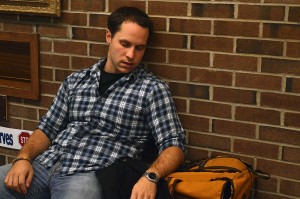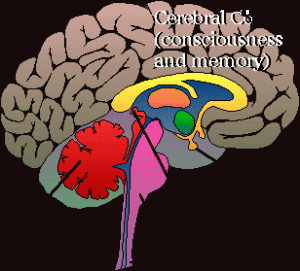Doctors recommend more sleep for students

Student sleeping on a bench at Leddy Library at the University of Windsor on Friday, October 24, 2014 (Photo by Melissa Amiouni)
Students at the University of Windsor say being sleep deprived is a choice and not an issue they cannot overcome.
Many students say the amount of sleep they get each day is six hours. Engineering student Odie Merheb, 19, say it is a normal thing and every student goes through it. Merheb said some blame for not getting enough sleep goes to all the studying he has to do.
“I just keep studying, but when I look at the time and realize its 3 a.m. I don’t even think about sleep because I have a test the next day,” Merheb said.
Although some blame does go to school work, Merheb said most of the time it is a choice and he chooses to procrastinate until a day before a test.
“I’m the one who is doing this to myself, I can always control it, but some people don’t because they’re used to that routine,” Merheb said.
University law student, Wesley Anderson, 25, also says it is a choice because he also procrastinates, which keeps him up late at night.
“I could use an extra hour of sleep but during the day I’m doing work. At the end of the day, I usually like to decompress and by the time I feel like I’m ready to go to bed, it’s usually kind of late and I’m usually up early for class or doing school work, so I try to get at least enough sleep to function,” Anderson said.
However, Anderson says less sleep does not affect his daily routines.
“It’s not affecting my life that bad. For sure I can use extra hours of sleep but I live somewhat a busy lifestyle so I kind of accept it,” Anderson said.
Being sleep deprived can lead to serious health issues like heart disease, high blood pressure, diabetes and stokes it’s also been estimated that 90 per cent of people with insomnia have other health conditions.
John Coates, a family physician practicing at the Windsor Family Health Team said that he recommends students get at least eight to nine hours of sleep.
“They will be able to work more efficiently when they allow their brain and body to recharge over a good night’s sleep,” Coates said.
Coates says he recommends students avoid caffeine after 4 p.m. and to get regular exercise for a good night’s sleep. He also recommends that electronics like phones and laptops should be avoided before bed since the blue light emitted by these devices has been shown to prevent the pineal gland from secreting melatonin, a chemical that helps signal to our body that it is time to sleep. Coates said he usually prescribes medicine for insomnia and not sleep deprivation.
“Sometimes I recommend melatonin 3-5 mg orally about one to two hours before bedtime for insomnia. I don’t prescribe medications for sleep deprivation,” Coates said.
Although Coates does not prescribe medicine for sleep deprivation, he says caffeine is helpful.
“The only stimulant I recommend is caffeine which has been shown to improve alertness and performance in sleep-deprived people and is safe at doses of 100-200 mg (8 oz. cup of coffee),” Coates said.
For students struggling with sleep deprivation, they can always visit their school’s student health centre for medical care, counselling and referrals.



